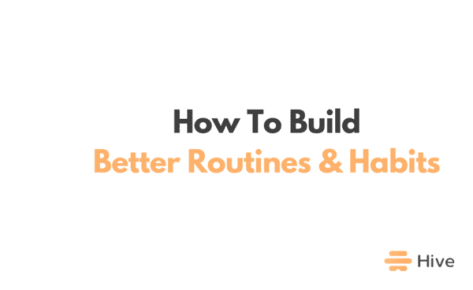Habits are the invisible architecture of our everyday lives. They are what we repeatedly do daily, whether we notice it or not. And while they’re often overlooked, habits have the power to transform your life.
Good habits and routines are the small we do daily that accumulate into significant results. They are a keystone of your career prospects and physical, mental, and social well-being!
Successful people build their lives on the firm foundation of good habits. They wake up early, exercise, read or journal, complete their most important tasks before noon, and more.
“All our life, so far as it has definite form, is but a mass of habits — practical, emotional, and intellectual — systematically organized for our weal or woe, and bearing us irresistibly toward our destiny, whatever the latter may be,” William James once said.
Effective habits improve your time management skills, strengthen your memory, and even help you reduce stress. Developing good habits and routines takes time, effort and a lot of practice. You might stumble and fall along the way, but if you keep getting back up again, you will eventually succeed at forming good habits.
Research shows that it takes an average of 66 days to build a new habit and up to 246 days to make that habit stick. That’s why so many attempts at forming habits fail — people don’t practice them long enough to make them stick. Use these rules to find and stick to better routines.
The first common rule: find, develop and stick to good habits you can sustain
Habits influence our behavior as much as our personality and values. To improve the invisible force that drives your actions and behaviors, you must find and develop routines, habits and rituals on purpose. And most importantly, start habits you can sustain.
Identifying good habits is an important step. Practicing the new routines and behaviors is real work — that is easier said than done.
If you’ve ever tried to start an exercise routine or special nutrition plan like the keto diet, you probably already know that developing good habits is not as easy as it sounds.
But you’ve got to start somewhere. So, start small, don’t overwhelm your brain. Don’t aim for 30 minutes of exercise — 5 minutes of stretch or 10 pushups is good enough if it will get you going.
Habits can be hard to develop because they go against how we naturally operate, but once you start practicing at the same time on a schedule that works for you, momentum will kick in and keep you going.
To succeed at building good habits, take control of when and where you perform a given routine. In other words, control the triggers that prompt good behaviors.
For example, if you want to eat healthier, you might develop rituals such as eating a salad before dinner instead of grazing on snacks in front of the television every night. Remind yourself of the ultimate goal and the many benefits when it gets hard to build better routines.
The second rule: don’t get attached to routines and habits — learn to let go when necessary
While developing good habits is key to a productive life, routines can easily become a “two-edged sword”. They can be addictive and sabotage our well-being.
“Habit is necessary; it is the habit of having habits, of turning a trail into a rut, that must be incessantly fought against if one is to remain alive,” says Edith Wharton.
We can easily get attached to routines without reviewing, upgrading, or even downgrading them to ensure they are still aligned with our goals.
It pays to measure them to make sure they are still serving us. Is your morning routine helping you become a better version of yourself? Are your habits stressing you? Do the benefits of your present evening routine outweigh the downsides? If you continue on the same path for another year, will your life get much better or worse?
Reinvention doesn’t just apply to fashion. It also extends to habits, routines and rituals. Improving your habits can be the perfect way for you to reinvent yourself.
“If you want different in your life, your actions will need to match that. Switch up your routines, create newer goals, take massive risks, pick up new hobbies, and try different styles. Fully embody the energy of change,” says Robin S. Baker.
The small, sometimes insignificant things we do daily, have a major impact on our lives, so it’s time to measure the structures, systems and processes that run your life to ensure you are on track with the way you want to live and work. Resetting your routines will do wonders for your personal and professional life.
It can be challenging to change old habits and develop new ones, but with practice, and self-discipline, you do more of what’s working and even improve old behaviors.
Life and work routinization is great if you can keep it fresh and exciting daily. When you find something that works, don’t stick with it forever. Try occasionally switching up your morning, work or evening routine to shake things up.
A dull routine doesn’t inspire real progress. Sometimes, “the less routine the more life,” argues Amos Bronson Alcott.
Schedule incredible surprises on purpose.
The key is not getting attached to any of them so that when you have an opportunity to switch things up and try something new, you’ll know that it will be easy to do in the future.
Good routines, habits and rituals are an excellent way to keep your life organized, but you shouldn’t set them in stone — don’t make them permanent. Explore, discover, experiment and make life fun and productive simultaneously.
This article originally appeared in Medium.
